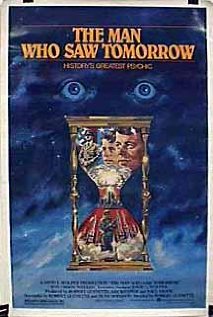The Man Who Saw Tomorrow
| The Man Who Saw Tomorrow | |
|---|---|
 |
|
| Directed by | Robert Guenette |
| Produced by |
Paul Drane Alan Goland (associate producer) Robert Guenette Lee Kramer David L. Wolper (executive producer) Peter Wood (associate producer) |
| Written by |
Nostradamus (book) Robert Guenette Alan Hopgood |
| Starring | Orson Welles (Presenter/Narrator) |
| Music by |
William Loose Jack Tillar |
| Edited by |
Scott McLennan Peter Wood |
| Distributed by | Warner Bros. |
|
Release date
|
|
|
Running time
|
90 minutes |
| Language | English |
The Man Who Saw Tomorrow is a 1981 documentary-style movie about the predictions of French astrologer and physician Michel de Notredame (Nostradamus).
The Man Who Saw Tomorrow is narrated by Orson Welles. The film depicts many of Nostradamus' predictions as evidence of Nostradamus' predicting ability, though as with other works, nothing is offered which conclusively proves his accuracy. The last quarter of the film discusses Nostradamus' supposed prediction for the then future of the 1980s, 1990s and beyond. There are no scientifically testable predictions directly included in this film, only suggestions and allusions.
Welles, though he agreed to host the film, was not a believer in the subject matter presented. Welles' main objection to the generally accepted translations of Nostradamus' quatrains (so called because Nostradamus organized all his works into a series of four lined prose, which were then collected into "centuries", or groups of 100 such works) relates in part to the translation efforts. While many skilled linguists have worked on the problem of translating the works of Nostradamus, all have struggled with the format the author used.
Nostradamus lived and wrote during a period of political and religious censorship. Because of this it is said he disguised his writings not only with somewhat cryptic language, but in four different languages (Latin, French, Italian and Greek). Not content with such obfuscation, Nostradamus is also said to have used anagrams to further confuse potential inquisitors (particularly with respect to names and places).
Welles himself completely rejected the central theme of the film after having made it. It is not known if Welles was contractually obligated to narrate the film, or if he simply grew disenchanted with its subject matter and presentation after completing it. Perhaps Welles' most public detraction from the subject matter of the film occurred during a guest appearance on an early 1980s episode of The Merv Griffin Show; "One might as well make predictions based on random passages from the phone book", he offered when asked about the film, before moving on to discuss other projects more interesting to him personally.
...
Wikipedia
